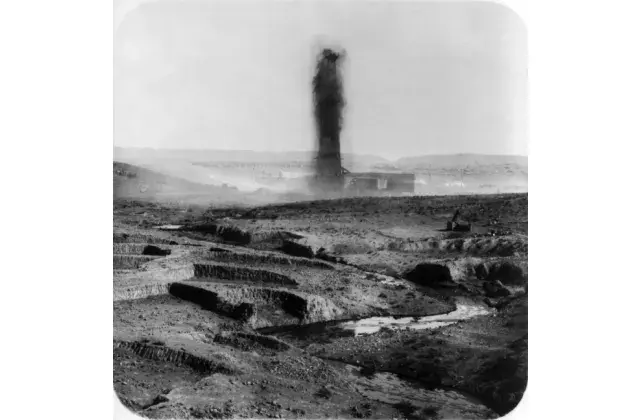The British Mandate and Iraqi Struggle for Independence (1920 - 1932)

The country known today as Iraq, was integrated in the Ottoman Empire and its own governance and vilayet system until the partition of the Ottoman Empire after the First World War (1914-1918). Known as Mesopotamia in Europe, it has been referred to as al-Iraq by Arab geographers since at least the eighth century. The area then consisted of three provinces – vilayets –, in the Ottoman language: Mosul, Baghdad and Basra. By the end of the First World War, British forces were already in control of these three provinces which were ruled from the British administrative headquarters in Baghdad.
In 1920, at the Conference of San Remo, the League of Nations approved the British Mandate for Iraq. Oppositions to British rule have always existed and shortly after the announcement of the Mandate, a nationwide armed revolt against British rule broke out at the end of June 1920. In London, the revolt and the cost of its suppression amplified the search for a more acceptable form of government in Iraq. Accordingly, Great Britain decided to maintain ‘indirect control’. In October 1920, Sir Percy Cox was sent back to Baghdad to take up the role of the first High Commissioner, the chief instrument of British policy in the country. His first official act was to form a new government. He persuaded Sayyid Abd al-Rahman al-Gailani to accept the presidency of an appointed Council of Ministers that would work under British supervision, leading to the formation of the new government in November of the same year. In March 1921, at the Middle East Conference, held in Cairo and organised by the British Colonial Office, the decision was taken to establish a monarchy in Iraq. Prince Faisal bin Hussein bin Ali al-Hashemi, member of the Hashemite family from Hijaz (today’s Saudi-Arabia) was appointed as king.
With King Faisal’s coronation ceremony on 23 August 1921, the modern state of Iraq was born. The British employed a divide-and-rule policy, creating divisions along ethnic and religious lines. They preferred to collaborate with Sunni Arabs who constituted less than 20 % of the population. In contrast, of the three million inhabitants of Iraq at the time, more than half were Shia, around 20 % were Kurdish, and the remaining 8 % composed of Christian, Jewish, Yazidi, Sabaen, and Turkmen minorities. King Faisal I was an astute and realistic politician, acutely aware of his own limitations, the fragility of his position, and of the struggle necessary to create a basis for his authority. This sensitivity, combined with considerable personal charm, served him well in consolidating his rule in Iraq. During his term of office, he continuously considered the diverse ethnic and religious composition of the country.
The Anglo-Iraqi Treaty, dated 10 October 1922, de facto codified the indirect British sovereignty for the next 20 years. Nevertheless, it also gestured towards the ostensibly temporary nature of the mandate, stating Britain’s obligation to obtain Iraq's admission into the League of Nations. On 10 July 1924, the Iraq Constituent Assembly ratified the Organic Law, as the constitution was called back then, which declared Iraq a constitutional monarchy and the Electoral Law soon afterwards – events that were surrounded by many concerns among the Iraqi authorities. In June 1926, the tripartite Anglo-Turkish-Iraqi Treaty finally settled the so-called Mosul question. The treaty defined that the Mosul Province would belong to Iraq.
In 1929, the first trade unions were established, among them the Artisans Union. In the same year, Prime Minister Abd al-Muhsin Saadun committed suicide due to his failure to negotiate with the British for more independence because he had been vilified by the public as pro-British. Baghdad’s third statue ever, inaugurated in November 1933, commemorated him.
In 1930, when Nuri al-Said became Iraqi Prime Minister, he rapidly negotiated a new Anglo-Iraqi-Treaty which was signed in June 1930. On 3 October 1932, Iraq was accepted as a member of the League of Nations, becoming the first Arab country to join this international organisation. Consequently, the British Mandate terminated and the Iraqi Kingdom achieved formal independence. Despite this appearance of independence, the 1930 treaty had come into force providing Great Britain several privileges for 25 years, among them military presence, but more important, the control of the oil sector, effectively making Iraq’s independence somewhat nominal. Despite the debate over true independence, that same year saw the installation of the postal service in Arabic. Previously, correspondence in Iraq was only permitted in English or French, with British employees controlling both the inboxes and outboxes.
This article was written by Hella Mewis and is licensed under CC BY-NC 4.0.






